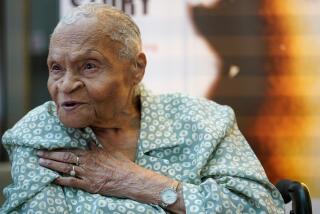Victories in 2 States Give Cigarette Makers a Boost
- Share via
Rattled by big losses in recent West Coast trials, cigarette makers got a boost Monday when a state court jury in Memphis, Tenn., found them not liable for the lung cancer deaths of three smokers.
The verdicts exonerating tobacco’s Big Three--Philip Morris Cos., R.J. Reynolds Co. and Brown & Williamson Tobacco Corp.--were the first since juries in San Francisco and Portland, Ore., ordered Philip Morris to pay damages of $51.5 million and $80 million, respectively, in a pair of lung cancer cases earlier this year. A trial judge later reduced the San Francisco award to $26.5 million.
R.J. Reynolds attorney James R. Johnson said that jurors once again “have agreed that smokers are well aware of the risks . . . and have reaffirmed that they generally will not award money to smokers who assume those risks.”
Because Tennessee is a tobacco state where laws generally favor the defense in product liability cases, many analysts had expected the industry to win. A loss would have been devastating, signifying that they could no longer count on winning in even a friendly environment.
Although the victory was good news for the $50-billion industry, “these [were] easier than average cases to win,” said David Adelman, a tobacco analyst at Morgan Stanley Dean Witter. “I don’t think the industry’s out of the woods.”
In another victory for tobacco companies Monday, a federal judge in Oklahoma dismissed a lawsuit on behalf of the nation’s smokers that challenged the industry’s right to raise prices to fund its multibillion-dollar settlement with the states.
Tobacco stocks were hammered by the San Francisco and Portland verdicts, and some analysts said cigarette makers will cite the Memphis victory as an indication that the West Coast verdicts are aberrant and reflect more liberal and anti-corporate attitudes.
“It’s going to give investors confidence that the industry can still win . . . when these trials are in jurisdictions that they perceive as fair,” said Gary Black of Sanford C. Bernstein & Co.
On Monday, Philip Morris’ shares rose $1 to close at $38, while shares in R.J. Reynolds’ parent, RJR Nabisco, fell $1.31 to $89.44. Both trade on the New York Stock Exchange.
Others found less comfort in such reasoning.
“There’s no shortage of plaintiffs, or plaintiffs’ lawyers, in either California or Oregon,” said Martin Feldman, a tobacco analyst with Salomon Smith Barney. “California simply on its own remains a major threat to the industry.”
The Memphis trial began Jan. 19 and involved separate claims by survivors of Bobby Newcomb, James W. Karney and Florence Bruch--all longtime smokers who died of cancer. R.J. Reynolds was named in one case, while Philip Morris and B&W; were defendants in two of the lawsuits that were consolidated for trial.
The 12 jurors rejected claims of negligence, strict liability and conspiracy to commit fraud. Following the verdict, foreman Rodney Marchand said that in two of the three cases, jurors were not persuaded that smoking caused the cancers.
“Everyone is disappointed by the verdict,” said Curtis D. Johnson Jr., the Memphis plaintiffs’ lawyer who tried the case with his sister, Florence Johnson, and veteran anti-tobacco lawyer Norwood Wilner of Jacksonville, Fla.
Tobacco companies last year settled claims by state attorneys general for nearly $250 billion. But they still face hundreds of suits by individual smokers--and the prospect of tens of thousands more if plaintiffs’ lawyers become convinced such cases can be won.
The industry also faces dozens of class-action suits, including one now being tried in Florida, and the threat of a federal suit seeking recovery of taxes spent treating sick smokers.
*
Times wire services were used in compiling this report.
More to Read
Inside the business of entertainment
The Wide Shot brings you news, analysis and insights on everything from streaming wars to production — and what it all means for the future.
You may occasionally receive promotional content from the Los Angeles Times.










